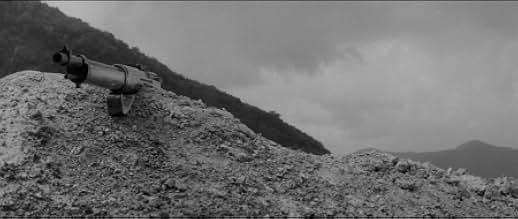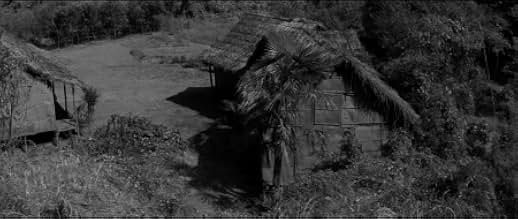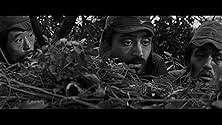IMDb RATING
7.9/10
5.6K
YOUR RATING
In the closing days of WWII, remnants of the Japanese army in Leyte are abandoned by their command and face certain death by starvation.In the closing days of WWII, remnants of the Japanese army in Leyte are abandoned by their command and face certain death by starvation.In the closing days of WWII, remnants of the Japanese army in Leyte are abandoned by their command and face certain death by starvation.
- Awards
- 6 wins total
- Director
- Writers
- All cast & crew
- Production, box office & more at IMDbPro
Featured reviews
This is undoubtedly the most harrowing black-and-white war film that I've watched; as a matter of fact, the only Western director during this time to remotely approach its level of intensity and sheer visceral power in his work was Samuel Fuller. By the way, I had attended a Kon Ichikawa retrospective at London's National Film Theatre in September 2002, but only managed to catch some of his work made between 1960 and 1973.
The film is certainly as depressing as it's reputed to be; however, it also displays welcome touches of black humor throughout - the 'dead' man who wakes up to answer a querying soldier and promptly 'dies' again, the deliciously ironic shoe exchange sequence, a moribund eccentric telling the famished hero which part of the body he should eat, etc. Incidentally, the script was written by a woman - Natto Wada, the director's own wife!
Ichikawa is a versatile and prolific film-maker whose reputation may not be as high as it was during his peak years (1956-65), but his direction here is often striking - the startling pre-credits sequence (the hero is violently rebuked by his superior officer for being discharged from hospital earlier than expected!), the death of a surrendering Japanese at the hands of a gun-toting Philippine woman, the bombing of a hospital (with the medical staff running away to save themselves, leaving the wounded soldiers behind to crawl out of the shack at their own limited pace), the automated march in the rain of the disillusioned soldiers (which also involves the afore-mentioned business with the shoes that, actually, recalls a similar scene in ALL QUIET ON THE WESTERN FRONT [1930]), a hill littered with the bodies of soldiers attempting to climb it, the finale, etc. Surely one of the film's major assets is the stunning cinematography of the unforgiving and desolate muddy landscape.
The film is notorious for treating the taboo subject of cannibalism (almost 10 years before it became a staple of horror movies) but Ichikawa's approach is not only subtle but highly effective: the flesh is actually referred to as "monkey meat", while the hero is seen partaking only once (and promptly spits out the piece along with most of his decaying teeth!); conversely, when the weak underling soldier (played by Mickey Curtis who, despite his name, was a Japanese pop idol of the time!) rabidly indulges, the ground nearby is splashed with blood.
In the supplements, Ichikawa remembers that Method-practicing lead actor Eiji Funakoshi (whose portrayal is unforgettable, by the way) arrived on the set at starvation point - with the result that production was forced to shut down for two weeks until he recuperated! Donald Richie's perceptive interview favors the nihilism of the film over the underlying patriotism behind such gut-wrenching recent Hollywood fare as SAVING PRIVATE RYAN (1998).
FIRES ON THE PLAIN is universally considered to be one of its director's top efforts and, out of the several films of Ichikawa I've watched, the closest to it in spirit are THE BURMESE HARP (1956; another character-driven war film but with a spiritual tone, and which is also available on DVD from Criterion) and ENJO aka CONFLAGRATION (1958; which was actually given a limited theatrical showing locally, as part of a foreign-film week, a couple of years ago). Personally, I also have a particular soft spot for the director's stunningly stylized color extravaganza, AN ACTOR'S REVENGE (1963), which I've actually caught twice at the NFT in 1999 and the afore-mentioned 2002 retrospective.
The film is certainly as depressing as it's reputed to be; however, it also displays welcome touches of black humor throughout - the 'dead' man who wakes up to answer a querying soldier and promptly 'dies' again, the deliciously ironic shoe exchange sequence, a moribund eccentric telling the famished hero which part of the body he should eat, etc. Incidentally, the script was written by a woman - Natto Wada, the director's own wife!
Ichikawa is a versatile and prolific film-maker whose reputation may not be as high as it was during his peak years (1956-65), but his direction here is often striking - the startling pre-credits sequence (the hero is violently rebuked by his superior officer for being discharged from hospital earlier than expected!), the death of a surrendering Japanese at the hands of a gun-toting Philippine woman, the bombing of a hospital (with the medical staff running away to save themselves, leaving the wounded soldiers behind to crawl out of the shack at their own limited pace), the automated march in the rain of the disillusioned soldiers (which also involves the afore-mentioned business with the shoes that, actually, recalls a similar scene in ALL QUIET ON THE WESTERN FRONT [1930]), a hill littered with the bodies of soldiers attempting to climb it, the finale, etc. Surely one of the film's major assets is the stunning cinematography of the unforgiving and desolate muddy landscape.
The film is notorious for treating the taboo subject of cannibalism (almost 10 years before it became a staple of horror movies) but Ichikawa's approach is not only subtle but highly effective: the flesh is actually referred to as "monkey meat", while the hero is seen partaking only once (and promptly spits out the piece along with most of his decaying teeth!); conversely, when the weak underling soldier (played by Mickey Curtis who, despite his name, was a Japanese pop idol of the time!) rabidly indulges, the ground nearby is splashed with blood.
In the supplements, Ichikawa remembers that Method-practicing lead actor Eiji Funakoshi (whose portrayal is unforgettable, by the way) arrived on the set at starvation point - with the result that production was forced to shut down for two weeks until he recuperated! Donald Richie's perceptive interview favors the nihilism of the film over the underlying patriotism behind such gut-wrenching recent Hollywood fare as SAVING PRIVATE RYAN (1998).
FIRES ON THE PLAIN is universally considered to be one of its director's top efforts and, out of the several films of Ichikawa I've watched, the closest to it in spirit are THE BURMESE HARP (1956; another character-driven war film but with a spiritual tone, and which is also available on DVD from Criterion) and ENJO aka CONFLAGRATION (1958; which was actually given a limited theatrical showing locally, as part of a foreign-film week, a couple of years ago). Personally, I also have a particular soft spot for the director's stunningly stylized color extravaganza, AN ACTOR'S REVENGE (1963), which I've actually caught twice at the NFT in 1999 and the afore-mentioned 2002 retrospective.
Despite its flaws, Fires On The Plain is one of the most harrowing and powerful films I've ever seen. With its incredible stark black and white photography, we're taken on an emotionally exhausting journey through how far a man will go to survive. It takes it to the bleak extremes and pushes the limits. It's incredible and fascinating to watch the "everyman" main character on his episodic adventure and has great points about the devastating effects of war on the human condition. This could've easily been a favourite if not for some points that hold it back. Although the journey later blossoms, the music is definitely far too overdramatic and it opens with far too on-the-nose exposition that could've easily been summed up in a few more simple visuals. Unfortunately for the excellent cinematography, the editing isn't as good and perhaps its suffers due to the amateur performances who struggle to keep up continuity in different angles. However, these flaws don't distract from its power, as depressing as it is.
8/10
8/10
In Ichikawa Kon's film _The Harp of Burma_ the company of soldiers led by Captain Inoue, although a bit travel worn and homesick, looked at least to be in decent health and well fed in the foreign environs of Burma. However, in his film _Fires on the Plain_ the Japanese soldiers stationed on the Island of Leyte in the Phillipines are malnourished, desperate men who are willing to do anything to survive
The first scene in the film depicts Pvt. Tamura being slapped viciously by his superior. The superior is angry because Tamura returned to their regiment. a sufferer of tuberculosis, Tamura is unable to support himself and relies on the other soldiers, who can barely forage enough food for themselves, to gather food for him. Not wanting a dependent in their midst, Tamura superior sends him back to the hospital along with a few potatoes. Tamura does, however, have one more key item in his possession: a hand grenade.
If he tires of living or is unable to, Tamura is to kill himself with the grenade. The grenade appears several times in the film. One can almost see the gears turning in his head, an inner struggle whether he wants to live or die. However, each times he decides to keep trudging along.
Tamura does in fact arrive back at the hospital, but of course he is refused. The doctors will only let men who are very near death to stay in the hospital. Tamura, unwanted in his own camp, decides to stat with a group of stragglers who have also been cast out of their respective companies. Tamura is able to make friends with these individuals at least until the Americans begin bombing the area. The doctors leave the patients, first taking all the food, to be blown up in the bombing, and Tamura and friend are separated to the four winds.
Tamura continues his travels and eventually arrives in a small village where he kills a Fillpino girl who would not stop screaming. He also tries to kill her boyfriend, but he runs away successfully.
Tamura begins to care for the wounded girl, but pushes her out of the way when he discovers a hidden cache of salt. He soon continues his journey to no real destination.
_Fires on the Plain_ is a brutal film which depicts the remnants of the once powerful Japanese army struggling to survive, but without any hope of ever being truly rescued. These soldiers just want to live for a few hours longer, their primal instincts to survive much stronger than dieing in service of the Emperor. A will to survive that will even make some of them eat "Monkey Meat."
However, even in this bleak film there are some signs of humanity. Tamura although tubercular and emancipated willingly shares his few rations and his precious salt even when he has little. There are moments of semi friendship between Tamura and the stragglers, and also between Tamura and another soldier named Nagamatsu, however, the outlook is bleak for our pleasant spoken Tamura.
Based on a novel written by Ooka Shohei.
The first scene in the film depicts Pvt. Tamura being slapped viciously by his superior. The superior is angry because Tamura returned to their regiment. a sufferer of tuberculosis, Tamura is unable to support himself and relies on the other soldiers, who can barely forage enough food for themselves, to gather food for him. Not wanting a dependent in their midst, Tamura superior sends him back to the hospital along with a few potatoes. Tamura does, however, have one more key item in his possession: a hand grenade.
If he tires of living or is unable to, Tamura is to kill himself with the grenade. The grenade appears several times in the film. One can almost see the gears turning in his head, an inner struggle whether he wants to live or die. However, each times he decides to keep trudging along.
Tamura does in fact arrive back at the hospital, but of course he is refused. The doctors will only let men who are very near death to stay in the hospital. Tamura, unwanted in his own camp, decides to stat with a group of stragglers who have also been cast out of their respective companies. Tamura is able to make friends with these individuals at least until the Americans begin bombing the area. The doctors leave the patients, first taking all the food, to be blown up in the bombing, and Tamura and friend are separated to the four winds.
Tamura continues his travels and eventually arrives in a small village where he kills a Fillpino girl who would not stop screaming. He also tries to kill her boyfriend, but he runs away successfully.
Tamura begins to care for the wounded girl, but pushes her out of the way when he discovers a hidden cache of salt. He soon continues his journey to no real destination.
_Fires on the Plain_ is a brutal film which depicts the remnants of the once powerful Japanese army struggling to survive, but without any hope of ever being truly rescued. These soldiers just want to live for a few hours longer, their primal instincts to survive much stronger than dieing in service of the Emperor. A will to survive that will even make some of them eat "Monkey Meat."
However, even in this bleak film there are some signs of humanity. Tamura although tubercular and emancipated willingly shares his few rations and his precious salt even when he has little. There are moments of semi friendship between Tamura and the stragglers, and also between Tamura and another soldier named Nagamatsu, however, the outlook is bleak for our pleasant spoken Tamura.
Based on a novel written by Ooka Shohei.
1945. The US recapture of the Philippines is nearing its conclusion, resulting in a Japanese unit being cut off and lacking supplies. In order to reduce the supply problem Private Tamura is ordered to check into the hospital and, if unsuccessful, kill himself. His trip to the hospital ends up being a harrowing journey.
A Japanese war drama that shows the horrors of war in brutal, unvarnished fashion. As much a survival drama as a war drama - we hardly see the enemy at all during the film - Tamura's experiences are harrowing and realistic.
Not perfect though. The film is quite linear and plodding, which is to be expected for the nature of the plot, but it is too slow at times, feeling laboured. While meant to show the inanity and insanity of war, some aspects of the plot aren't entirely watertight.
Still, a great exposition on the wastefulness and depravity of war.
A Japanese war drama that shows the horrors of war in brutal, unvarnished fashion. As much a survival drama as a war drama - we hardly see the enemy at all during the film - Tamura's experiences are harrowing and realistic.
Not perfect though. The film is quite linear and plodding, which is to be expected for the nature of the plot, but it is too slow at times, feeling laboured. While meant to show the inanity and insanity of war, some aspects of the plot aren't entirely watertight.
Still, a great exposition on the wastefulness and depravity of war.
I recently saw "Nobi" ("Fires On the Plain"), for the second time. Of all Ichikawa's films, and most of his films - (the ones I've seen), even "Tokyo Olympiad", has a strong thread of despair running through them. This is one of the few films (especially as its from the Japanese perspective), that deals, uncompromisingly, with how ordinary soldiers deal with, and are prepared to go, to survive a war where no prisoners were taken. It's a depressing film, but it should be seen by all the people, especially the Generals and Politicians, who think war is an heroic endeavour.
Did you know
- TriviaIn order to achieve maximum authenticity, actors were fed very little, and were not permitted to tend to matters of simple hygiene such as brushing their teeth and cutting their nails. As a precaution against serious deterioration of the actors' health, a number of nurses were always on call on the set. Eiji Funakoshi was never specifically told not to eat. He willingly abstained from eating to help get himself into character. The rest of the cast and crew were unaware of this until he eventually collapsed on the set. Production was shut down for two weeks.
- ConnectionsFeatured in L'Oeil du cyclone: Cannibalisme, réalité ou fantasme (1995)
- How long is Fires on the Plain?Powered by Alexa
Details
- Runtime
- 1h 48m(108 min)
- Color
- Aspect ratio
- 2.35 : 1
Contribute to this page
Suggest an edit or add missing content


























